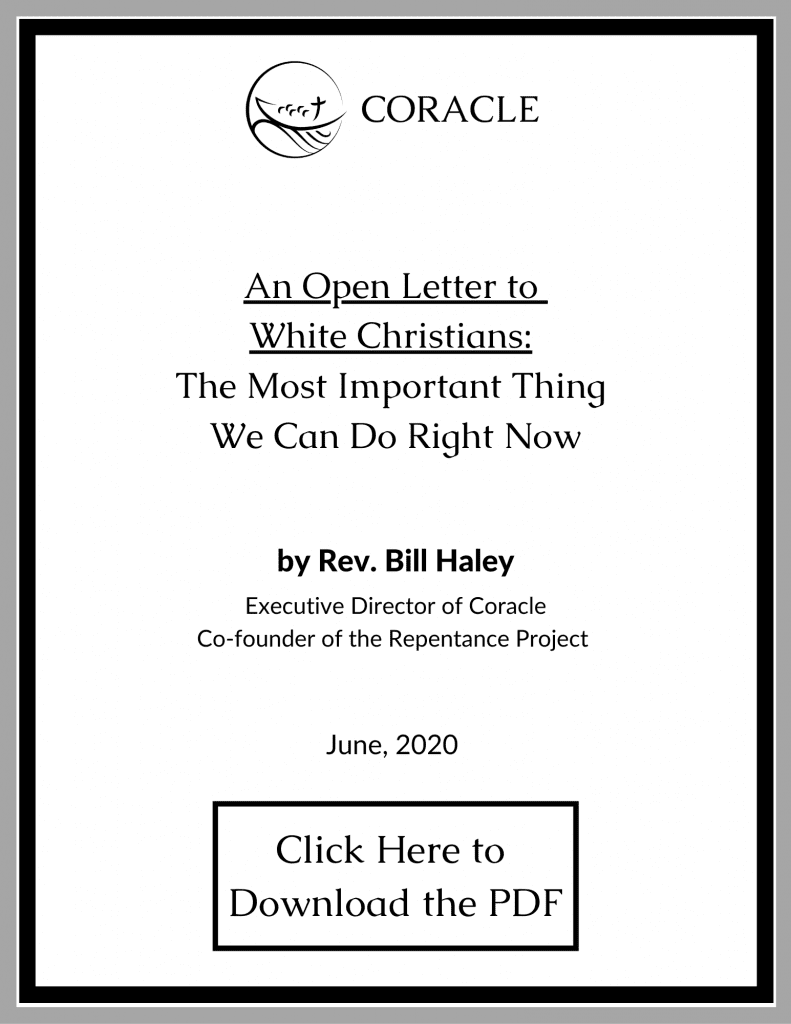 My dear brothers and sisters in Christ,
My dear brothers and sisters in Christ,
I’m writing to you in the wake of the deaths of Ahmaud Arbery, Breonna Taylor, and George Floyd and in the context of ongoing protests across the United States and the world calling for racial justice. I’m a Christian, and also a white, male American.
I’ve spent almost all of my adult life advocating and working for racial justice, healing, and reconciliation in various forms and degrees. For some time I was responsible for directing outreach at The Falls Church, a large, suburban, mostly white congregation in northern Virginia, and led efforts to engage issues of race and reconciliation in Washington DC, and then for a good long time lived in the inner-city there, where I planted a church in a homeless shelter. My family moved out of the city to the rural countryside of the Shenandoah Valley of Virginia, only to providentially discover that the land we purchased held on it a forgotten and overgrown cemetery of enslaved African Americans, which would become known as the Corhaven Graveyard. Five years ago, from that hallowed land, the Repentance Project was born, an effort by a group of friends to call white Christians particularly to recognize the depth of our country’s racial injustice past and present, repent in word and action, and seek to be agents of repair in the context of relationships.
I share all this to say that for the majority of my 51 years, I’ve thought long and hard about what white people, and especially white Christians, should do in response to the racial wounds inflicted on African Americans in our country’s past and the ongoing racial inequities that persist. For the majority of that time, my answer was generally “Do something”, and that something would take different forms according to the person I was speaking with or the audience I was talking to or the project I was working on at the time.
About a year and a half ago, I realized that my answer had changed. When asked, “What should white people do to respond to racial issues in America?”, I would say that the most important thing a white person could do is to learn. Learn about the length and depth and breadth of our country’s original sin that began in 1619 in Jamestown, through the slavery years, up to the Civil War in the 1860s. Learn about the Jim Crow era that was in force for another hundred years. Learn about the ways that those 350 years of consciously-created and legally-supported systems of injustice based on race were not remotely absolved or solved by the Civil Rights movement of the 1960s. Learn how ubiquitously the bitter fruit of personal and systemic racism persists today, right now, in 21st century America. And learn about the church’s role in all of that.
I believe that if a person is simply willing to learn about the history of race and racism and its present manifestations, God will know how to lead them to their right actions.
In a recent interview in the Noble Pursuit magazine, I answered this question this way, “Commit to learning for a year by watching the movies, reading the books, by doing the study, by chasing the questions, which is a lot more costly, actually, than some sort of social media activism. A white person will know they have done enough study when they feel paralyzed, nauseous, and unable to do a darn thing… that’s when you’ve begun to understand how deep this goes, when you’ve been crushed by the grief. The good news and bad news is that you don’t have to work very hard to be crushed by grief, all you have to do is slow down and actually start learning.”
I stand by that answer, even now. However, right now, I think there’s something even more important for white Christians to do.
The most important thing white Christians must do today is to talk to other white people about the depth of the history of racism in our past, its ongoing legacy, and the current reality of racial injustice in the present systems and structures that order our country.
What keeps the racial wounds in our country raw and is the greatest impediment to racial justice and healing in our land is that not enough white people get what’s wrong or understand the reality of the problem or don’t treat it with the gravity that it is due. The barrier to substantive and lasting change and healing is that not enough white people are awake enough yet.
This lack of awareness and understanding of America’s racial reality can manifest itself in certain responses to the black cry for change like, “Well, I know it’s bad, but it’s not that bad” or “All of this was addressed in the 1960s, why are we still talking about it?” or “All this talk about racial justice is just some leftist agenda” or a response to “Black Lives Matter” dismissed by the retort, “Well, Blue (or All) Lives Matter”. The latter phrase is of course true, but it is also true and must be recognized that in our history and our present, black lives matter less, oftentimes much less.
It takes longer than 50 years to undo 350 years of our country’s operating system, especially when those 50 years have been consistently marked by resistance to racial equity and real change.
White people who do not understand the various and manifold perpetuations of racial injustice are the greatest barrier to change, at least for as long as we constitute the majority of America’s racial demographics.
There is a particular burden on any Christian of any race to engage brokenness in the power of God to bring redemption and healing and a different future. We do, after all, follow Jesus, whose whole life and mission could be summed up that clearly and that simply.
And thus my call to white Christians who do understand the depths of the racial wounds and the tentacles of racial injustice in America is to proactively engage white people, Christians and not, on the topic of race in order to help them understand it too. One form of this engagement is to not shrink away from hard conversations when they happen to come up, and another is to initiate these conversations.
On Sunday, May 24, the day before George Floyd was killed, I preached at a church on the topic of “deliver us from evil” from the Lord’s Prayer. I had cause to briefly mention that racism in the systems of our country was a manifestation of evil and said that what happened to Ahmaud Arbery was an illustration of it. I received an email from one who heard it, also a white male Christian, which began sincerely with a beautiful spirit of brotherly love and encouragement. He then took me to task for inserting my own political agenda and unnecessarily broaching a highly divisive topic from the pulpit. This person wrote that my statements were simply echoing a “well-known Leftist anti-American theme” and requested that I cease from inserting such things in my sermons.
For several reasons, I decided to take the time to write back at length, and it took nearly three hours to compose the email, offer some resources, and suggest we talk more on the phone. It was clear to me that the most important thing I could do in that moment, while the protests surrounding George Floyd’s death ramped up, was to challenge a white Christian brother’s assertion that holding to the reality of systemic racism in America could be dismissed as merely a political ploy or platform. It was important for me to push back, and I trust this will lead to further meaningful and fraternal conversation.
One way to talk right now is not shrinking back from hard conversations, even if long and costly. Another way to talk is to proactively initiate the conversation.
Earlier this week a young woman, a friend who lives in northern Virginia, reached out to me and shared that as the protests picked up momentum, she felt compelled by the Spirit to drop everything immediately and drive to her hometown in the southern Midwest simply to be able to engage her family and relatives in conversations around race. And she did, barely even packing a suitcase. At the same time, she’s picked up the phone to talk to other white friends and Christian leaders about these things in order to promote real conversations even if there’s not always agreement. Some of those conversations have been good, some of them have been hard. She understands, though, that if things are going to change, it will be because white people– those who hold the most power in America– have changed.
To engage white people on issues of race in America can be painful, and it is too much to keep asking black people to lead the way or even to show us the way. We who are the inheritors of those who made racial injustice part of America’s DNA and are still all-too-often complicit in its sustainability must now stand up and speak more loudly to our own white brothers and sisters, and perhaps especially to our white brothers and sisters in Christ.
Specifically to white pastors of majority-white congregations, the most important thing you can do right now is to speak and lead boldly with regards to these topics.
Specifically to white parishioners in majority-white congregations, one of the most important things you can do right now is to talk to your pastor and encourage and even plead with him or her to speak and lead with regards to these issues.
So what is the most important thing a white Christian can do in these days where literally millions of voices are crying out for change and justice?
Learn, yes.
But right now, white Christians gotta talk to white people.
By directly engaging the forces of darkness– in this case, the racism that infects us all and harms too many– we will be following in the footsteps of our Lord Jesus Christ who did not shrink away from that which was wrong and very broken; rather, he conscientiously engaged it and even defeated it, so that every person and all people could have a very different future together and with him. May God’s future, marked by healing and reconciliation, justice and shalom, true community and diversity, be America’s future as well, perhaps precisely because Christians have taken the lead.
On the Journey,

Bill Haley is an Anglican priest and the Executive Director of Coracle and a co-founder of the Repentance Project.
You might also consider:
- Doing “An American Lament” from The Repentance Project which begins June 22. This 50-day devotional tool offers prayers, scripture, and reflections on the American history of slavery and Jim Crow and its ongoing legacy today.
- Reading “The Color of Compromise” by Jemar Tisby
- Looking through “Resources for Racial Healing and Justice,” something we curated for the learning journey.
“SOUNDINGS” posts are aimed at considering together topics that are important for our society, for the Church, and for our own spiritual journeys. To ‘take a sounding’ is a nautical term about using depth to determine where you are and where you’re going. These writings are designed to do just that. Please share this post with friends you think might appreciate it. If you would like to get SOUNDINGS posts from me sent directly to your inbox, click here.
